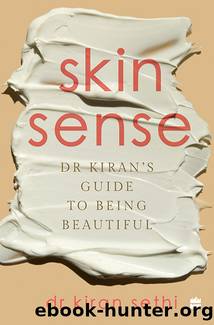Skin Sense by Kiran Sethi

Author:Kiran Sethi
Language: eng
Format: epub
Tags: null
Publisher: HarperCollins India
Published: 2022-01-15T00:00:00+00:00
Any of these reasons (or many or all of them) could be causing us gut-trouble. So how do we fix it?
Here is your âletâs heal the gutâ action plan. Take a screenshot, print it and pin it on your fridge to remind yourself how to take care of your gut.
Take probiotics: Start taking probiotic supplements containing friendly bacteriam which produce anti-inflammatory chemicals that fight the unfriendly ones and help protect the stomach environment.
Eliminate sugar and refined carbohydrates: Sugary foods and drinks trigger the release of large amounts of the hormone insulin, which in turn is a trigger for inflammation. The more insulin there is, the more inflammation there will be.
Reduce vegetable oils: Vegetable oils that contain inflammatory omega-6 are ubiquitous in ready-made meals and take-outs. To avoid the toxicity of these oils, it might be easier to cook all your food from scratch using butter, ghee or coconut oil.
Avoid alcohol: Alcohol is a well-known depressant, gut irritant, and a contributor to leaky gut syndrome.
Increase vegetables in your diet: Add as many vegetables as you can manage, especially the brightly coloured ones, including peppers, tomatoes, red onions and eggplants. Make sure that you also eat at least one portion each day of dark leafy greens, such as cabbage, broccoli and spinach.
Include fermented foods: Foods such as live yoghurt, kefir, sauerkraut and pickled vegetables increase the levels of lactic acid bacteria such as Lactobacillus acidophilus, which help in settling your stomach.
Eat oily fish: Omega-3 fatty acids, found abundantly in oily fish, are an important indicator of the gut-mind connection. Patients with depression have been found to have lower blood omega-3 levels than others.
Review your medications: Determine if you are taking NSAIDs (non-steroidal anti-inflammatory drugs) with your doctor and see if any alternatives are available. Also, ask your doctor when you can avoid taking antibiotics.
Avoid allergens: Gluten, which has a long association with leaky gut, is found in wheat, barley, rye and oats. If you suspect a leaky gut, avoid gluten.47
Download
This site does not store any files on its server. We only index and link to content provided by other sites. Please contact the content providers to delete copyright contents if any and email us, we'll remove relevant links or contents immediately.
So Young, So Sad, So Listen: A Parents' Guide to Depression in Children and Young People by Philip Graham Nick Midgley(565)
Vital Signs by Izzy Lomax-Sawyers(465)
Wilderness and Survival Medicine by Ellis Chris Breen & Dr Craig(319)
Eating and Growth Disorders in Infants and Children by Joseph L. Woolston(313)
Case Studies in Adult Intensive Care Medicine by Daniele Bryden(311)
Boxed Set 1 Dermatology by Dr Miriam Kinai(287)
Manufacturing Social Distress by Robert W. Rieber(270)
Data Analysis in Sport by O'Donoghue Peter Holmes Lucy(253)
Vision and Perception by Howard Burton(234)
Yoga by Seber Isaiah(232)
Neuroradiology - Expect the Unexpected by Martina Špero & Hrvoje Vavro(227)
A History of Neuropsychology by J.Bogousslavsky & F. Boller & M.Iwata(223)
Complications in Vascular and Endovascular Surgery by Earnshaw Jonothan J;Wyatt Michael G;(215)
Basic and Advanced Laboratory Techniques in Histopathology and Cytology by Pranab Dey(214)
Qigong Massage for Your Child with Autism by Anita Cignolini(212)
Manufacturing social distress : psychopathy in everyday life by Robert W. Rieber(212)
The Psychology of Enhancing Human Performance by Gardner Frank L.;Moore Zella E.;(204)
A Patient's Guide to Cataract Surgery: Normal and LASIK Reshaped Cornea by Unknown(199)
The Liferaft Survival Guide by Howorth Michael;Howorth Frances;(199)
